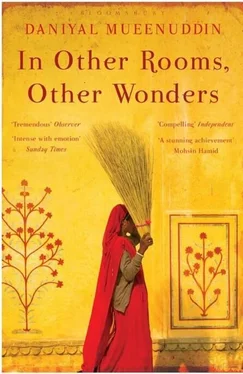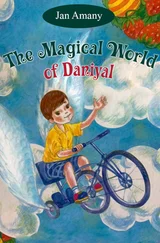‘Well, it’s warm,’ she said. The sun beat down, the dust on the roses seemed heavy, under a banyan tree the grass didn’t grow. She kicked off her shoes, felt the cool earth.
‘Lie down here,’ she said, ‘next to me, hold me.’
And though they might have been seen, he did.
All the afternoon they walked around together, even in the house, looking at the paintings, the furniture. Rafik wanted to sit with the drivers, but she said no, she wanted to be with him alone. Hassan banged around the kitchen, he had eaten too many of the samosas .
That evening she said to Rafik, ‘I’ll be back in half an hour.’
She went to her own room. Her husband lay on the bed, on his pills, twitching his fingers.
‘Look,’ she said, standing over him. ‘You’re a mess. You’ve been a mess for two years. Now I’ll never sleep in your bed again.’
He began to cry, his emaciated face, his long yellow teeth. This she hadn’t expected. He sobbed, real tears. She sat down on the broken chair in the corner, looking at the shelf on which she kept her few things, a metal jar of eyeliner, a tin box thrown out by Kamila that once held chocolates.
‘Will I still get my money?’
Then she stood up again. ‘Yes, but if you ever say one funny word, that’s it.’
She took some clothes, and when she hung them from a nail in Rafik’s room he said nothing. She held him all night, his face in her breasts.
Only once, waking, she thought, That was our marriage feast, drugged samosas, and she felt sad and worn and frightened.
Now she slept each night in Rafik’s bed, leaving her husband to his addiction. Fall and winter came, the leaves fell, at night they slept under a heavy quilt that the managers at the farm sent to Rafik as a present. She slept naked, which still after five months disturbed him. Rafik woke before dawn, to say his prayers, then went into the kitchen and had tea with Hassan. The Sahib woke early, and Rafik had duties until mid-morning. When he came to wake her, she would pretend still to be asleep, face hidden in the quilt — she always slept with her head covered. He would bring a cup of tea and some toast.
‘Come in with me,’ she would say, moving over in the bed, leaving a warm spot, and sometimes he would. Her long hair hung down, and she would brush it, while he told her about the guests who had come for bridge, or about some feud in the kitchen. He read the Urdu paper New Times, sitting in the morning sun, wearing ancient horn-rimmed glasses with thick lenses. She bought him a warm woolen hat and carefully washed and mended his clothes. She wanted everyone to see how well she cared for him. She said, ‘You wear me on your back, and I wear you on my face.’ Her face had softened.
She missed one period, then a second, but said nothing to Rafik.
They had finished making love one afternoon, and were talking, her head on his shoulder.
He was stroking her belly.
‘I might as well tell you. See how I’m bigger? I’m pregnant.’
He pushed her head away and sat up. ‘That’s bad.’
‘If that’s how you feel, I’ll go to my village and get rid of it.’
‘I’m married. I have a son your age.’
She got out of bed, dressed, and went out, turning for a moment at the door. ‘I’ll never forget what you said when I told you.’
Where to go? She walked out the gate, in the direction of Lawrence Gardens, a few blocks away. Looking up into the cradle of branches in an enormous flame-of-the-forest tree, she thought, God, I’m nothing, look at how small I am next to this tree. It must be hundreds of years old. But I won’t give up the baby. I’d rather have the baby than Rafik.
That night she had nowhere else to sleep, and so went into Rafik’s quarters — she couldn’t bear to be with her husband, who used more and more of the rocket pills and stayed up all night smoking cigarettes.
‘Forgive me,’ Rafik said.
‘I’m going to have it, you can keep me here or throw me out. In any case, I’ll have it in my village, there are no women here to help me.’
The next day he went to the bazaar in the morning, and when she came to his room for the afternoon nap he gave her a tiny suit, blue knitted trousers, a blue shirt, mittens, and a hat with a pompom, printed with little white rabbits.
So he accepted her condition and would run his hands over her growing belly, speaking to the life within. When it moved, she would put his hand there to show him. None of the other servants said anything openly, though they had expected it; and of course she could claim it was her husband’s child. Hassan once jokingly congratulated her, but she responded so gently that he too became silent.
Rafik obtained a month’s leave for her.
Before she left for the village he gave her a lot of money, ten thousand rupees, which he had saved up over the years, even after sending maintenance to his family.
‘I can’t take this.’
‘For me, for our baby — in case you need a doctor.’
She arrived at her village at dusk, taking a rickshaw from the bus station. The open field next to the village had become a collecting pool for the sewage from the city, the water black.
‘Look, Saleema’s come,’ the neighbors said, as she walked through the narrow lane to her mother’s house, carrying two plastic bags full of food, meat and sugar, tea, carrots, potatoes. The walled compound didn’t have a door, just a dirty burlap cloth made of two gunnysacks sewn together. Children ran behind her and peeked in.
Her mother sat on a charpoy, peeling potatoes, her long thin hair braided and red with henna.
She didn’t even get up, she kept peeling the potatoes.
‘I’m back.’
‘Are you in trouble? You’re pregnant.’
‘No,’ she lied.
‘I bought a goat with the money you sent.’
‘I can see.’ The goat, tied to a stake, nibbled at a handful of grass.
The single room was almost completely bare, not even a radio.
Saleema made a curry, kneeling by the little hearth, over a fire of twigs.
As they ate, sitting on the bed, Saleema asked, ‘Where’s my brother?’
‘Bholu doesn’t come here much. I don’t give him money.’
‘Where do you get money besides what I send?’
‘It isn’t easy anymore, that I can tell you. You’ll find out someday what it’s like to be old. I sweep the Chaudrey’s house, I sell milk from the goat.’
The next day she told her mother about Rafik and the baby.
‘Did your husband throw you out?’
‘I forgot about him long ago.’
She wanted to explain that she had become a respectable woman, but knew that her mother would never understand.
Her mother found out about the money and wheedled day and night. Saleema kept the money in a pouch that she wore under her shirt. Late one night, she woke to find her mother stealthily untying the pouch with thin practiced hands.
When Saleema sat up, her mother at first said, ‘I thought I saw a scorpion.’ Then, ‘You owe me, you gravid bitch, coming here puffed up after your whoring. This isn’t a hotel.’
‘It’s not my money. And I’ve been buying all the food.’
‘It sure seems like your money.’
The mother lay in her bed, coughing.
The old midwife from the village, with filthy hands and a greedy heart, brought the baby into the world, a little boy.
Rafik immediately bonded with his son. He had been in Lahore when his other children, conceived during ten-day leaves, were born and grew up. He named the child Allah Baksh, God-gifted one.
Saleema sat leaning against the wall of the quarters while Rafik played with the little baby, which held his finger in its tiny hand. He clapped and made a crooning sound, until the baby laughed, showing its red toothless gums.
Читать дальше












